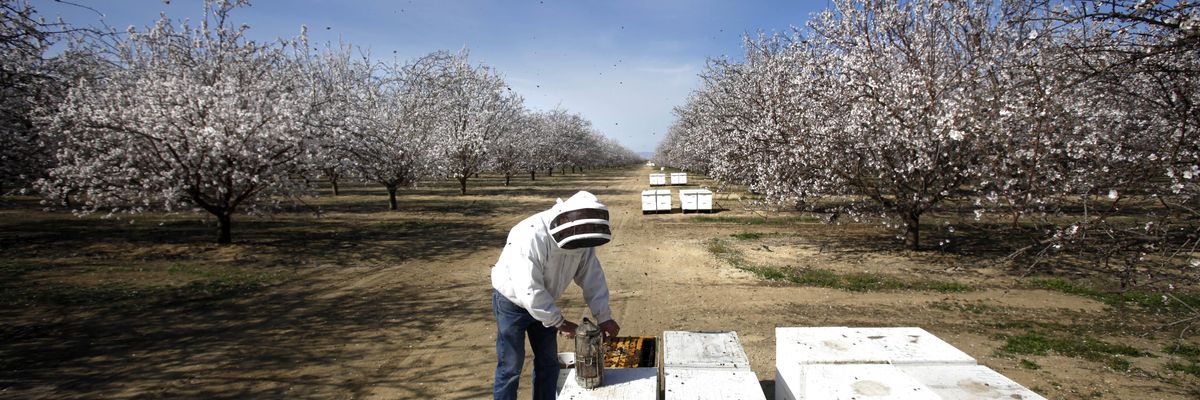Beekeepers this year in the United States reported the second highest annual loss of managed honey bee colonies since records began in 2006, according to results of a nationwide survey released Wednesday.
The non-profit Bee Informed Partnership (BIP) said in its preliminary analysis that beekeepers--ranging from small backyard keepers to commercial operations--lost 45.5% of their colonies between April 2020 and April 2021. The results are based on a survey of over 3,300 U.S. beekeepers managing a combined 192,384 colonies.
"The worrisome part is we see no progression towards a reduction of losses."
"This year's survey results show that colony losses are still high," said Nathalie Steinhauer, BIP's science coordinator and a post-doctoral researcher in the University of Maryland Department of Entomology, in a statement.
The annual loss is 6.1 percentage points higher than the average loss rate of 39.4% over the last 10 years, the researchers said.
"Though we see fluctuations from year to year," said Steinhauer, "the worrisome part is we see no progression towards a reduction of losses."
During winter beekeepers reported losses of 32.2%--9.6 percentage points higher than last year and 3.9 points higher than the 15-year average. Summer losses came in at 31.1%. While that figure is 0.9 percentage points lower than last year, it's 8.6 points higher than the survey average.
The beekeepers attributed the losses this year to a number of factors, with the parasitic Varroa destructor mite being cited most frequently for winter losses and queen issues most frequent for summer losses. Other causes of colony loss beekeepers cited included starvation, weather, and pesticides.
Continued losses are bad news for food security, as agricultural crops like blueberries and almonds rely on the bees for pollination.
"Beekeepers of all types consistently lose a high number of colonies each year, which puts a heavy burden on many of them to recoup those losses in time for major pollination events like California almonds," said survey co-author Geoffrey Williams, an assistant professor of entomology at Auburn University.
"Colony losses remain elevated," he said, "and this year's annual and summer loss rates are among the highest recorded."
For Jason Davidson, senior food and agriculture campaigner with Friends of the Earth, the survey results were a damning indictment of the U.S. Environmental Protection Agency's (EPA) failure to act on what conservation advocates call an "insect apocalypse" that was furthered by the Trump administration's pro-pesticide industry decisions.
"These bee losses highlight the disturbing lack of progress from the EPA in the fight to protect pollinators from toxic pesticides," said Davidson, urging the EPA not to "sit on the sidelines while beekeepers experience horrific losses year after year."
"It will take meaningful policy protection and rapid market change to reverse these unsustainable declines in honey bees and to protect the future of our food supply," he added.
BIP's findings were delivered during National Pollinator Week and as Rep. Earl Blumenauer (D-Ore.) reintroduced (pdf) the Saving America's Pollinators Act.
Pollinators, Blumenauer said Wednesday, are "critically important to the food we eat and the environment that sustains us. Unfortunately, our pollinators weren't immune from [former President Donald] Trump's war on science and the environment. In fact, they were a target, as the previous administration actually fought to allow more bee-killing pesticides back on the market."
"Now, it's up to us to work overtime to protect them, which is why I've reintroduced the Saving America's Pollinators Act," he said.
According to Emily Knobbe, policy manager at the Center for Food Safety, which endorsed the legislation, "National Pollinator Week is the perfect time for Rep. Blumenauer to reintroduce his progressive pollinator protection bill--and a perfect time to ask legislators to support this continued dedication to pollinators."
She said the latest version of the bill rightly responds to the decline in pollinator health, pointing to the 80% decline in 20 years of the Eastern Monarch butterfly populations as one example. She also pointed to a group of pesticides called neonicotinoids, or neonics, as key to pollinator recovery, given their links to pollinator harm.
"Rep. Blumenauer's bill would require not a suspension, but a ban on all neonicotinoid pesticides," wrote Knobbe. "This change to the proposed legislation reflects that the time for requesting incremental action from the EPA has passed."
"Pollinators need swift action in order to survive--banning neonicotinoids would provide a lifeline for these essential species," she said.

